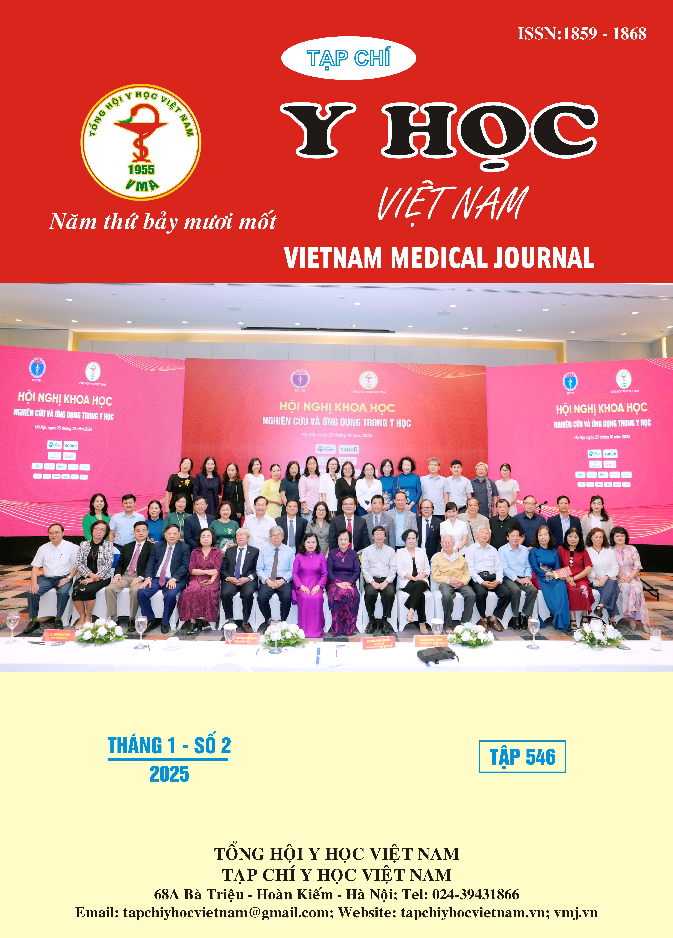CLINICAL OUTCOMES OF VA ECMO IN REFRACTORY CARDIOGENIC SHOCK: A RETROSPECTIVE STUDY AT CHO RAY HOSPITAL
Main Article Content
Abstract
Objective: This study aimed to evaluate the clinical efficacy of veno-arterial extracorporeal membrane oxygenation (VA ECMO) in patients with refractory cardiogenic shock unresponsive to medical treatment at the Cardiology Department, Cho Ray Hospital, from 2022 to 2024. Methods: A retrospective study was conducted on 100 patients with refractory cardiogenic shock unresponsive to medical interventions within 6 hours. Data analyzed included hemodynamic parameters, blood lactate levels before and after ECMO intervention, and in-hospital survival rates. Results: From February 2022 to June 2024, 100 patients (58% female) underwent VA ECMO, with a median age of 35 years. The main etiologies were myocarditis (65%), acute myocardial infarction (11%), and drug intoxication (10%). Before ECMO, the mean arterial pressure was 55 mmHg, and blood lactate level was 4.2 mmol/L, reflecting severe deterioration. After 24 hours of ECMO, survivors showed significant improvement: heart rate decreased by 27 bpm, systolic blood pressure increased by 22 mmHg, and blood lactate levels reduced by 1.9 mmol/L. The highest in-hospital survival rate was observed in the drug intoxication group (80%), while the acute myocardial infarction group had the lowest rate (9%). Conclusion: VA ECMO is an effective intervention for severe cardiogenic shock; however, meticulous post-intervention management is essential to minimize complications and optimize outcomes
Article Details
Keywords
VA ECMO, circulatory support, refractory cardiogenic shock, Cardiology Department
References
2. Harjola VP, Lassus J, Sionis A, et al. Clinical picture and risk prediction of short-term mortality in cardiogenic shock. Eur J Heart Fail. May 2015;17(5):501-9. doi:10.1002/ejhf.260
3. Jentzer JC, Baran DA, Kyle Bohman J, et al. Cardiogenic shock severity and mortality in patients receiving venoarterial extracorporeal membrane oxygenator support. Eur Heart J Acute Cardiovasc Care. Dec 27 2022;11(12):891-903. doi:10.1093/ehjacc/zuac119
4. Lorusso R, Shekar K, MacLaren G, et al. ELSO Interim Guidelines for Venoarterial Extracorporeal Membrane Oxygenation in Adult Cardiac Patients. Asaio j. Aug 1 2021;67(8):827-844. doi:10.1097/mat.0000000000001510
5. Thiagarajan RR, Barbaro RP, Rycus PT, et al. Extracorporeal Life Support Organization Registry International Report 2016. Asaio j. Jan/Feb 2017;63(1):60-67. doi:10.1097/ mat.0000000000000475
6. Van Diepen S, Katz JN, Albert NM, et al. Contemporary Management of Cardiogenic Shock: A Scientific Statement From the American Heart Association. Circulation. Oct 17 2017;136(16): e232-e268. doi:10.1161/cir.0000000000000525
7. Weiner L, Mazzeffi MA, Hines EQ, Gordon D, Herr DL, Kim HK. Clinical utility of venoarterial-extracorporeal membrane oxygenation (VA-ECMO) in patients with drug-induced cardiogenic shock: a retrospective study of the Extracorporeal Life Support Organizations' ECMO case registry. Clin Toxicol (Phila). Jul 2020;58(7):705-710. doi:10.1080/15563650.2019.1676896


